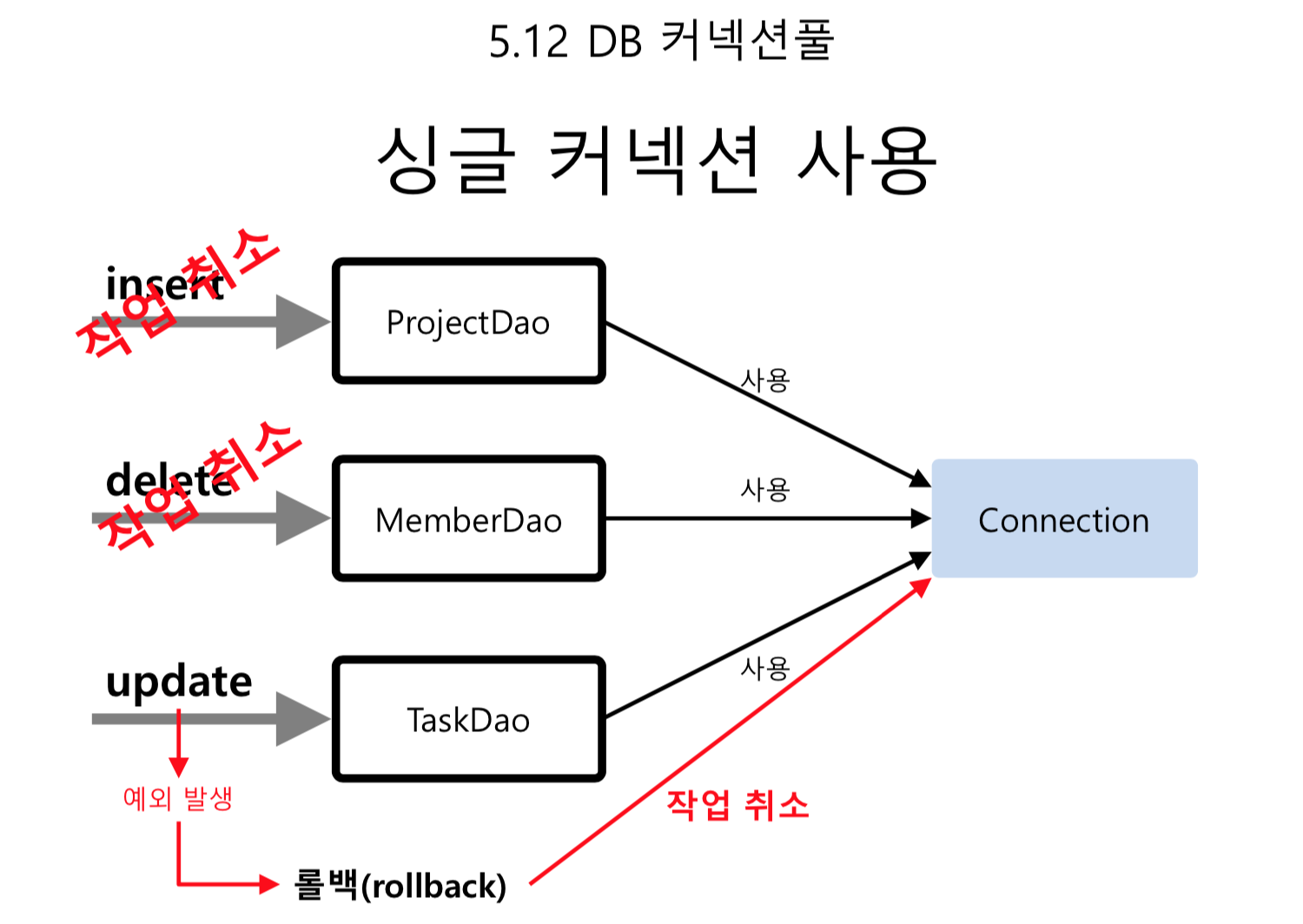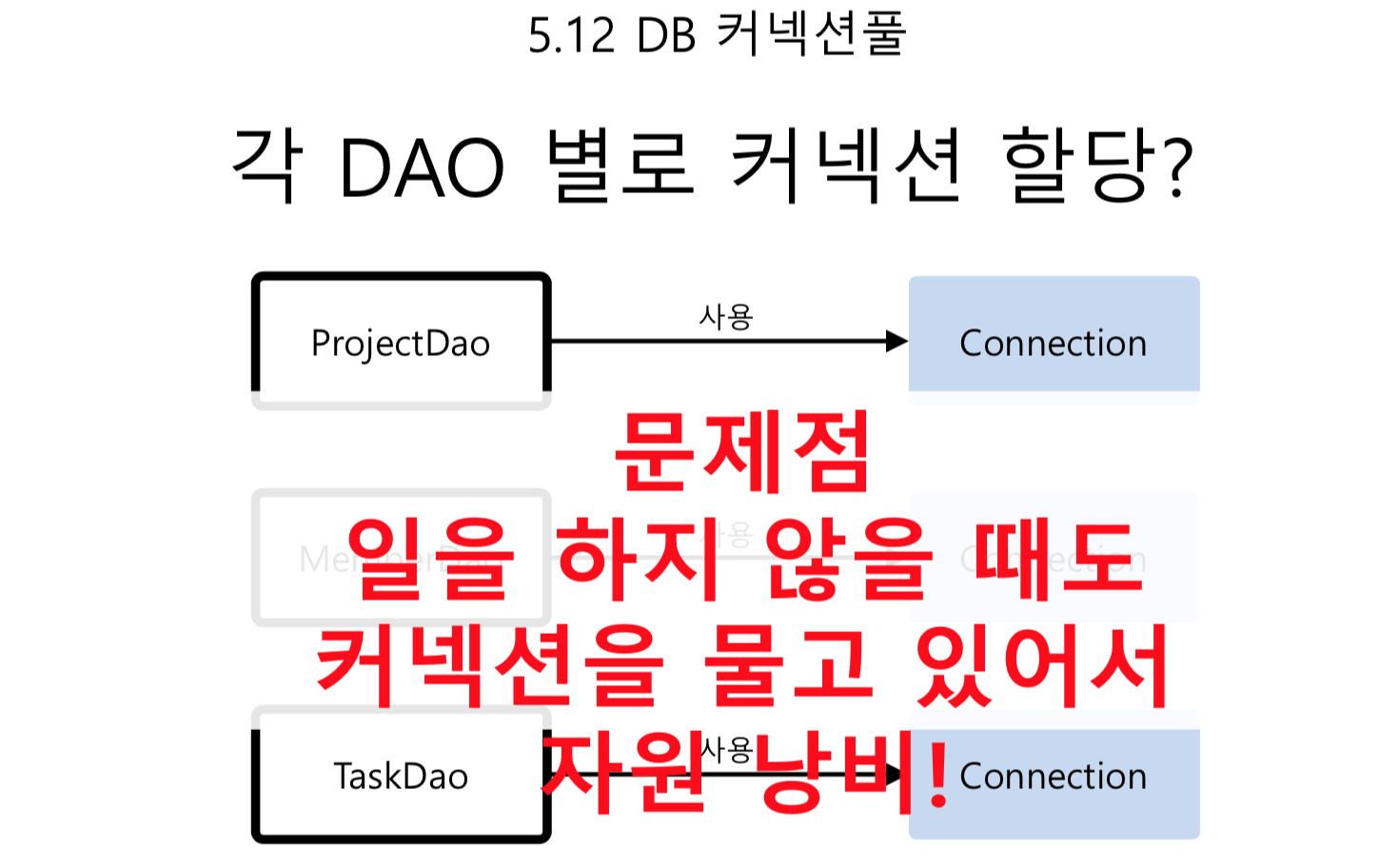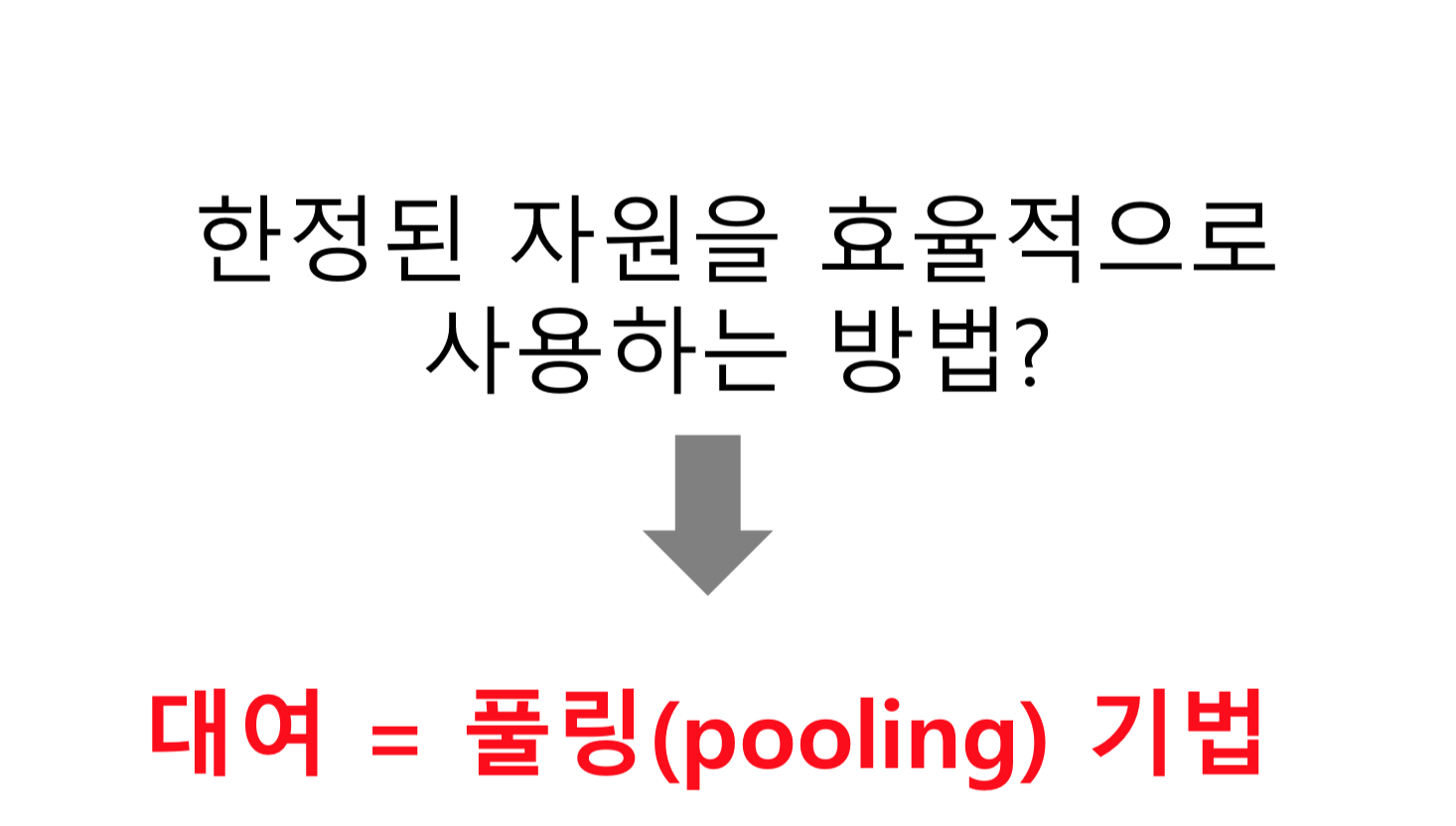싱글 커넥션
: 같은 커넥션을 이용하는 DAO들의 작업에 영향을 준다.
하나의 connection 객체(contextListener)를 공유하면 예외발생시 문제의 소지가 있다.
하나에서 rollback 했는데 다른 dao들에게까지 영향을 미칠 수 있다.

해결책은 무엇일까?
-> 쓸 때마다 생성하는 것은 낭비이다.

Connection Pool
: 미리 여러개를 만들어놓고 돌아가면서 쓸 수 있도록 하는 방식.
빌려주고 반납하는 방식!
미리 만들어 놓는 것과 필요할 때마다 만드는 것은 속도차이가 많이 난다.
미리 만들어놓은 것이므로 속도 저하가 발생하지 않는다.

DBConnectionPool.java
package spms.util;
import java.sql.Connection;
import java.sql.DriverManager;
import java.util.ArrayList;
public class DBConnectionPool {
final int PRE_POOL_SIZE = 10;
String url;
String username;
String password;
ArrayList<Connection> connList = new ArrayList<Connection>();
public DBConnectionPool(String driver, String url,
String username, String password) throws Exception{
this.url = url;
this.username = username;
this.password = password;
Class.forName(driver);
//미리 pool size만큼(10개) 만들어놓기
for(int i=0; i<PRE_POOL_SIZE; i++) {
connList.add(DriverManager.getConnection(url, username, password));
}
}
// Connection 객체를 요청하면 대여해줌
public Connection getConnection() throws Exception{
// 현재 저장된 여유분이 존재한다면
if(connList.size() > 0) {
// 1번째 Connection객체를 꺼낸다
//remove는 remove된 객체를 반환한다
Connection conn = connList.remove(0);
// DBMS는 일정시간 아무 요청이 없는 경우 timeout에 의해 연결이 해제된다.
// 그러므로 확인을 해야한다.
// Connection객체가 DB와 연결되어 있다면
if(conn.isValid(10)) {
// 꺼낸 것을 리턴한다
return conn;
}
}
//여유분이 없으면 새로 연결해서 리턴한다
return DriverManager.getConnection(url, username, password);
}
//빌려서 사용하고 다 사용했으면 Connection 객체를 반납한다
public void returnConnection(Connection conn) throws Exception{
if(conn != null && conn.isClosed()==false) {
connList.add(conn);
}
}
//종료시 모든 Connection 객체 닫기
public void closeAll() {
for(Connection conn : connList) {
try {
conn.close();
}catch(Exception e) {
e.printStackTrace();
}
}
}
}MemberDao.java
package spms.dao;
import java.sql.Connection;
import java.sql.PreparedStatement;
import java.sql.ResultSet;
import java.sql.Statement;
import java.util.ArrayList;
import java.util.List;
import spms.util.DBConnectionPool;
import spms.vo.Member;
public class MemberDao {
DBConnectionPool connPool;
public void setDBConnectionPool(DBConnectionPool connPool) {
this.connPool = connPool;
}
public List<Member> selectList() throws Exception {
Connection connection = null;
Statement stmt = null;
ResultSet rs = null;
final String sqlSelect = "SELECT mno,mname,email,cre_date" + "\r\n" + "FROM members" + "\r\n"
+ "ORDER BY mno ASC";
try {
// 커넥션풀에서 Connection객체를 빌려온다
connection = connPool.getConnection();
stmt = connection.createStatement();
rs = stmt.executeQuery(sqlSelect);
ArrayList<Member> members = new ArrayList<Member>();
while (rs.next()) {
members.add(new Member().setNo(rs.getInt("mno")).setName(rs.getString("mname"))
.setEmail(rs.getString("email")).setCreatedDate(rs.getDate("cre_date")));
}
return members;
} catch (Exception e) {
throw e;
} finally {
try {
if (rs != null)
rs.close();
} catch (Exception e) {
e.printStackTrace();
}
try {
if (stmt != null)
stmt.close();
} catch (Exception e) {
e.printStackTrace();
}
// 다 썼으면 반납하자
connPool.returnConnection(connection);
}
}
public int insert(Member member) throws Exception {
Connection connection = null;
int result = 0;
PreparedStatement stmt = null;
final String sqlInsert = "INSERT INTO members(email,pwd," + "\r\n" + "mname,cre_date,mod_date)" + "\r\n"
+ "VALUES(?, ?, ?, NOW(), NOW())";
try {
// 커넥션풀에서 Connection객체를 빌려온다
connection = connPool.getConnection();
stmt = connection.prepareStatement(sqlInsert);
stmt.setString(1, member.getEmail());
stmt.setString(2, member.getPassword());
stmt.setString(3, member.getName());
result = stmt.executeUpdate();
} catch (Exception e) {
throw e;
} finally {
try {
if (stmt != null)
stmt.close();
} catch (Exception e) {
e.printStackTrace();
}
// 다 썼으면 반납하자
connPool.returnConnection(connection);
}
return result;
}
public int delete(int no) throws Exception {
Connection connection = null;
int result = 0;
Statement stmt = null;
final String sqlDelete = "DELETE FROM MEMBERS WHERE MNO=";
try {
// 커넥션풀에서 Connection객체를 빌려온다
connection = connPool.getConnection();
stmt = connection.createStatement();
result = stmt.executeUpdate(sqlDelete + no);
} catch (Exception e) {
throw e;
} finally {
try {
if (stmt != null)
stmt.close();
} catch (Exception e) {
e.printStackTrace();
}
// 다 썼으면 반납하자
connPool.returnConnection(connection);
}
return result;
}
public Member selectOne(int no) throws Exception {
Connection connection = null;
Member member = null;
Statement stmt = null;
ResultSet rs = null;
final String sqlSelectOne = "SELECT MNO,EMAIL,MNAME,CRE_DATE FROM MEMBERS" + " WHERE MNO=";
try {
// 커넥션풀에서 Connection객체를 빌려온다
connection = connPool.getConnection();
stmt = connection.createStatement();
rs = stmt.executeQuery(sqlSelectOne + no);
if (rs.next()) {
member = new Member().setNo(rs.getInt("MNO")).setEmail(rs.getString("EMAIL"))
.setName(rs.getString("MNAME")).setCreatedDate(rs.getDate("CRE_DATE"));
} else {
throw new Exception("해당 번호의 회원을 찾을 수 없습니다.");
}
} catch (Exception e) {
throw e;
} finally {
try {
if (rs != null)
rs.close();
} catch (Exception e) {
}
try {
if (stmt != null)
stmt.close();
} catch (Exception e) {
}
// 다 썼으면 반납하자
connPool.returnConnection(connection);
}
return member;
}
public int update(Member member) throws Exception {
Connection connection = null;
int result = 0;
PreparedStatement stmt = null;
final String sqlUpdate = "UPDATE MEMBERS SET EMAIL=?,MNAME=?,MOD_DATE=now()" + " WHERE MNO=?";
try {
// 커넥션풀에서 Connection객체를 빌려온다
connection = connPool.getConnection();
stmt = connection.prepareStatement(sqlUpdate);
stmt.setString(1, member.getEmail());
stmt.setString(2, member.getName());
stmt.setInt(3, member.getNo());
result = stmt.executeUpdate();
} catch (Exception e) {
throw e;
} finally {
try {
if (stmt != null)
stmt.close();
} catch (Exception e) {
}
// 다 썼으면 반납하자
connPool.returnConnection(connection);
}
return result;
}
public Member exist(String email, String password) throws Exception {
Connection connection = null;
Member member = null;
PreparedStatement stmt = null;
ResultSet rs = null;
final String sqlExist = "SELECT MNAME,EMAIL FROM MEMBERS" + " WHERE EMAIL=? AND PWD=?";
try {
// 커넥션풀에서 Connection객체를 빌려온다
connection = connPool.getConnection();
stmt = connection.prepareStatement(sqlExist);
stmt.setString(1, email);
stmt.setString(2, password);
rs = stmt.executeQuery();
if (rs.next()) {
member = new Member().setName(rs.getString("MNAME")).setEmail(rs.getString("EMAIL"));
} else {
return null;
}
} catch (Exception e) {
throw e;
} finally {
try {
if (rs != null)
rs.close();
} catch (Exception e) {
}
try {
if (stmt != null)
stmt.close();
} catch (Exception e) {
}
// 다 썼으면 반납하자
connPool.returnConnection(connection);
}
return member;
}
}ContextLoaderListener
package spms.listeners;
import java.sql.Connection;
import java.sql.DriverManager;
import javax.servlet.ServletContext;
import javax.servlet.ServletContextEvent;
import javax.servlet.ServletContextListener;
import spms.dao.MemberDao;
import spms.util.DBConnectionPool;
public class ContextLoaderListener implements ServletContextListener {
DBConnectionPool connPool;
@Override
public void contextDestroyed(ServletContextEvent sce) {
try {
System.out.println("contextDestroyed");
//웹 어플리케이션이 종료시 모든 Connection 객체를 닫는다
connPool.closeAll();
}catch(Exception e) {
e.printStackTrace();
}
}
@Override
public void contextInitialized(ServletContextEvent sce) {
try {
System.out.println("contextInitialized");
ServletContext sc = sce.getServletContext();
connPool = new DBConnectionPool(
sc.getInitParameter("driver"),
sc.getInitParameter("url"),
sc.getInitParameter("username"),
sc.getInitParameter("password"));
//dao 객체를 만들었고 dao객체 필드영역인 conn에 db를 연결했다.
MemberDao memberDao = new MemberDao();
memberDao.setDBConnectionPool(connPool);
//conn객체 대신 memberDao 객체를 공유
sc.setAttribute("memberDao", memberDao);
}catch(Exception e) {
e.printStackTrace();
}
}
}ContextLoaderListener에서 driver, url, id, pwd를 가져와서 memberDao에 심어준다. 서블릿에서는 dao를 활용해서 db에 연결이 가능한 것이다.